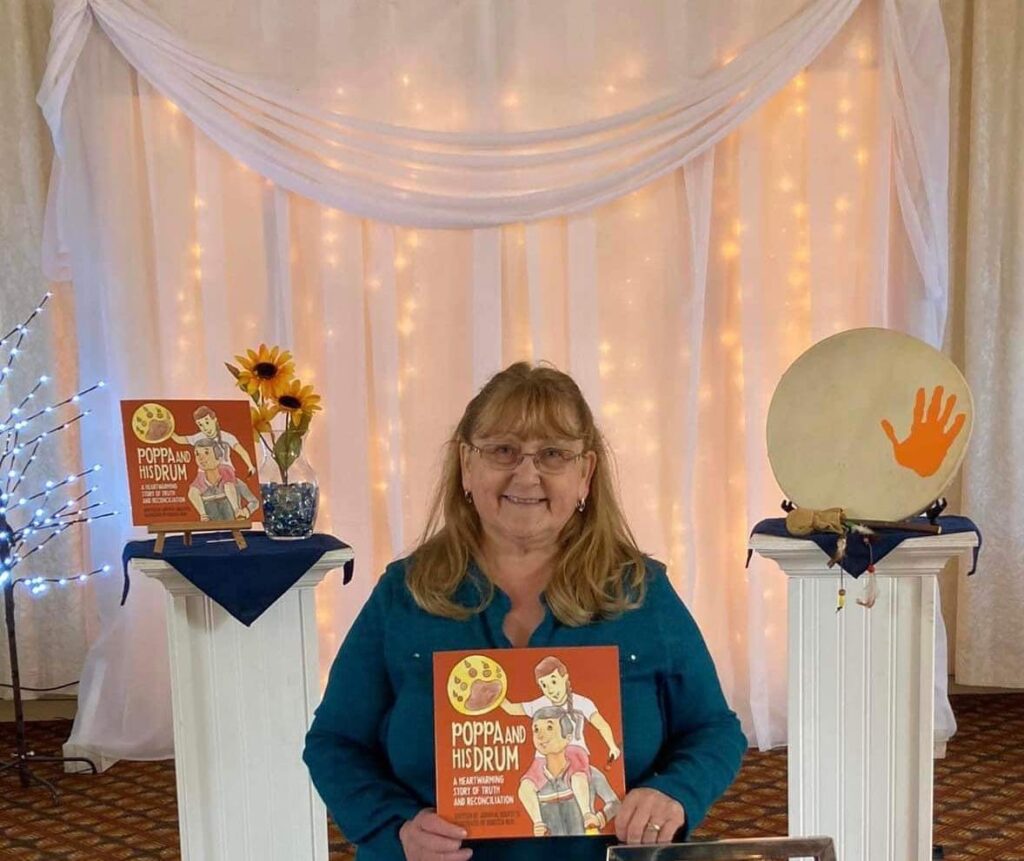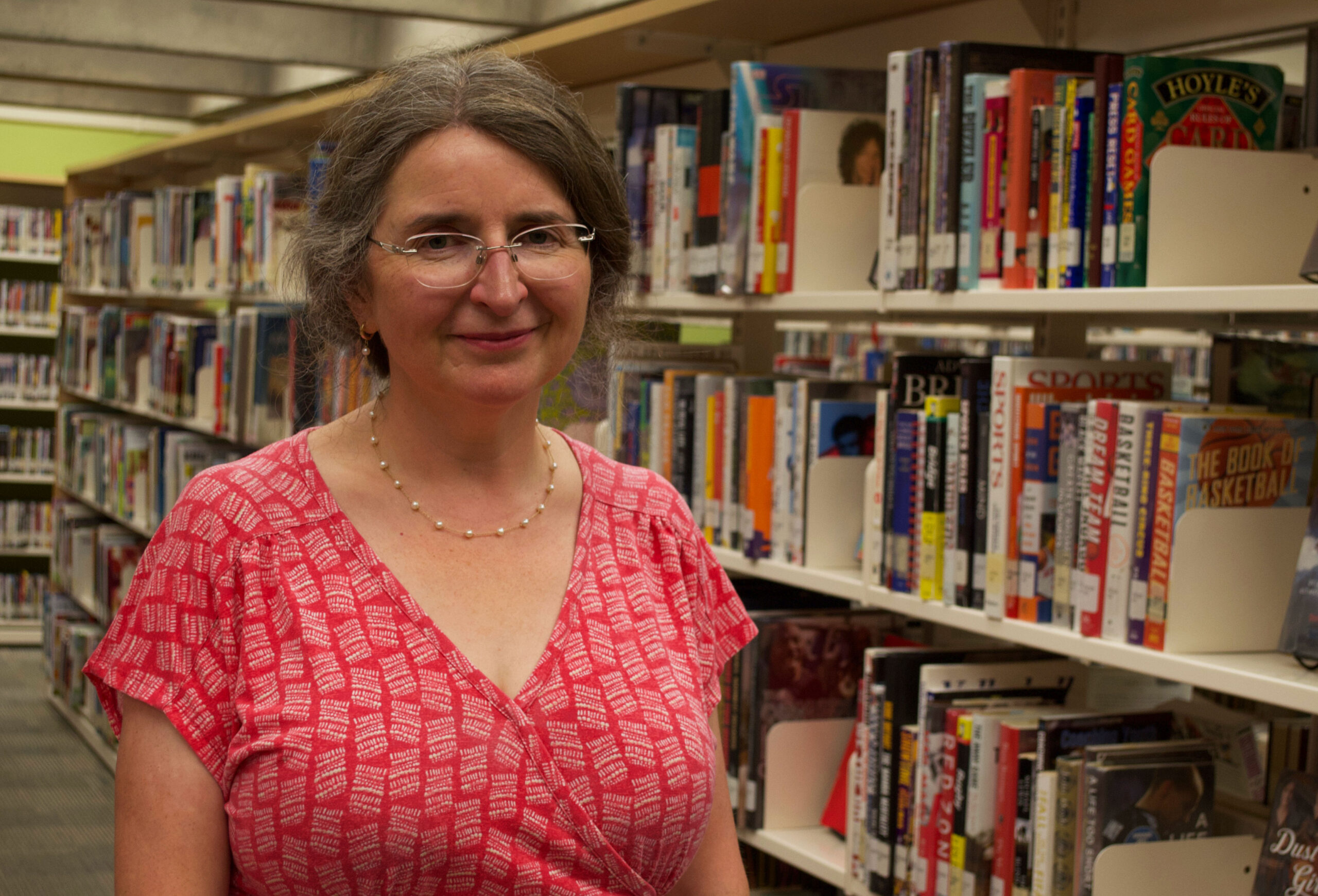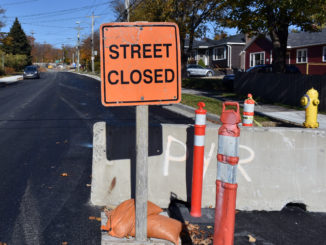The focus on Indigenous books is on the rise at libraries, and a local author is celebrating that. She thinks when children have access to these stories, things can change for the better.
Madison Ryan
Kicker

Tucked between countless children’s books at the A.C. Hunter Public Library is Poppa and His Drum. Its author believes storytelling is one of the keys to preserving Indigenous history.
Judy Doucette Falle’s new children’s book was published by Flanker Press in 2023 to much acclaim from teachers, parents and residents of her hometown. As a Mi’kmaw woman from St. George’s, she felt like she needed to tell the story of her father’s mistreatment during the 1940s at the strictly English-speaking school he attended during childhood. In the book, her father, Francis Doucette, gets to experience a heartfelt reclaiming of Mi’kmaq culture – he proudly plays his drum in front of his grandson’s class, after years of shame.
“It’s not only my dad’s life,” she said. “There’s so many people here on the west coast that are French Indian – it’s everybody’s poppa’s story.”
Poppa and His Drum is one of many books included in Indigenous programming at the Newfoundland and Labrador Public Libraries. Bonnie Morgan, the Newfoundland and Labrador collections and services librarian based at the A.C. Hunter Public Library, agrees that Indigenous storytelling has great value.

“The whole mandate of the public library is to make materials accessible, which means we’re really well placed to raise up diverse voices, Indigenous voices, that maybe have been neglected in the past,” Morgan said.
Although Doucette Falle’s late father was never in a residential school, the author decided to publish Poppa and His Drum in solidarity with the Truth and Reconciliation Commission. She says children should know what happened to the French Indigenous people of western Newfoundland, as well as the children who suffered through the residential school system.
It’s just one of many steps that must be taken towards reconciliation.
“I think it’s so important to teach children this – to tell them that we were here, we are here– strong Indigenous people who would not be wiped out by colonialism,” said Doucette Falle.
She says storytelling can be a balm for intergenerational trauma.
“Let grandma and grandpa, great-grandma and great-grandpa, tell their stories. Listen to the beautiful things that they have to say … we can reclaim what they tried to take from us. We’re rebuilding. We’ll come back stronger.”
– Judy Doucette Falle
Poppa and His Drum started as a bedtime story for Doucette Falle’s granddaughter. She quickly decided it was something bigger, something important. After years of Mi’kmaq history being hidden, Doucette Falle wanted to encourage children and families to embrace their culture.
What started small now sits on library book shelves all over the province, for children and educators alike to read as they please. The first floor of the A.C. Hunter Public Library in St. John’s – the dedicated children’s floor – is complete with colourful walls, fall decorations, and several displays of multicultural books. An Indigenous collection lies among these. This is the integration and representation Morgan strives for in her programming.

Morgan says it’s important to avoid the othering of Indigenous books.
“When we’re doing a story time on shapes or story time on families or love, we incorporate Indigenous stories into that,” Morgan said. “The real representation and inclusion happens week to week, month to month.”
The library has been expanding its Indigenous programming. This summer, they welcomed Emily Critch, a Mi’kmaw writer, as the first Indigenous storyteller in residence. That program was funded by TD Canada, and the library has funding for two more years, says Morgan. Resources for truth and reconciliation can be found on the library website as well. These include guides on residential schools, book lists, and links to Truth and Reconciliation Commission reports.
Poppa and His Drum, said Doucette Falle, has seen acclaim from many different people– many of whom happen to be teachers who have invited her to read the story to their students.
“Oh, my good gracious,” she said, beaming. “The reception from everybody I talked to has been awesome. When I would go to powwows or all the other outlets, even bookstores to do book signings, everybody who picked it up agreed that … it has to be told in school.”
The National Day for Truth and Reconciliation is on Sept. 30. Doucette Falle encourages people to take time with their loved ones to reflect upon what happened to the families impacted by the residential school system, and to listen to the stories.
“Let grandma and grandpa, great-grandma and great-grandpa, tell their stories. Listen to the beautiful things that they have to say … we can reclaim what they tried to take from us. We’re rebuilding. We’ll come back stronger.”
Madison Ryan is an award-winning fiction writer and a student journalist. She loves escaping into fantasy stories and a good cup of tea. Madison believes there is great power in words.




Be the first to comment